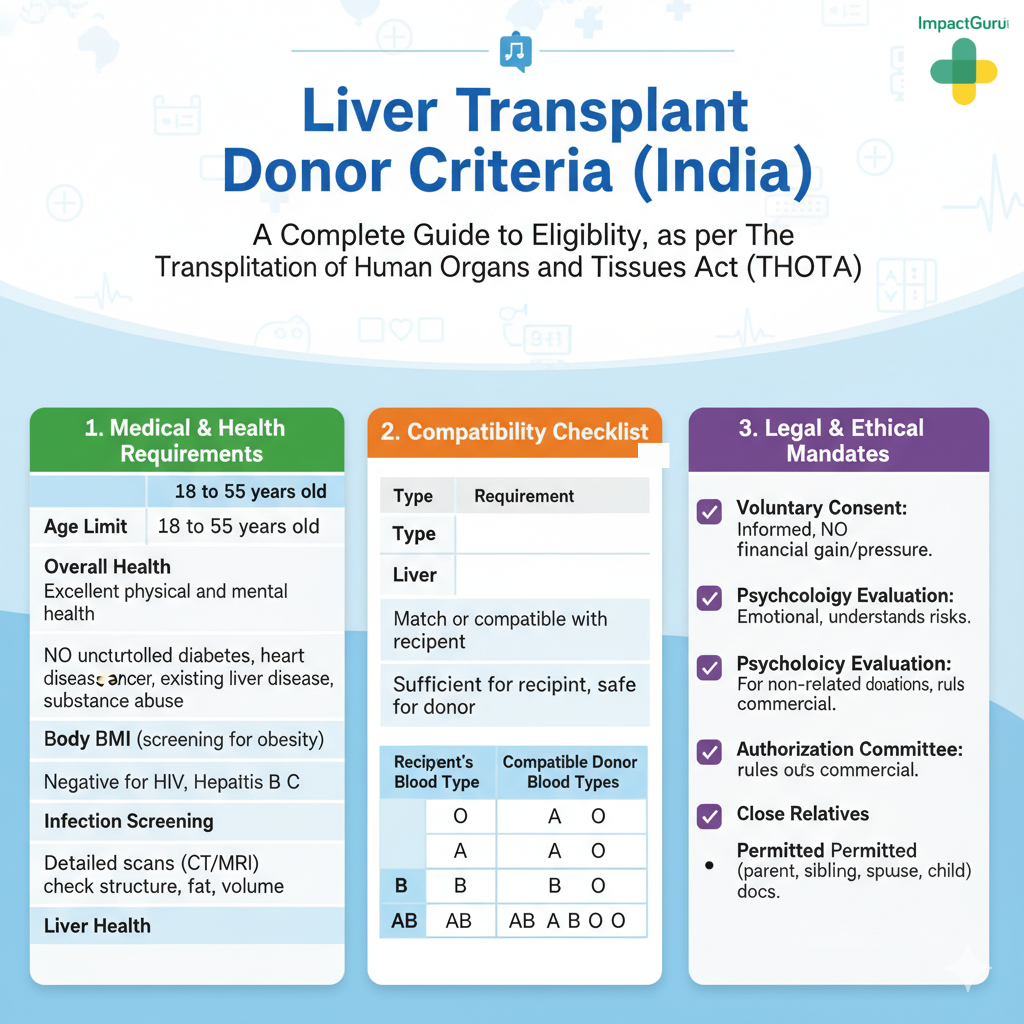When a failing liver threatens a life, finding a matching donor becomes a race against time. Despite major medical advancements that have made liver transplants safer and more successful than ever, the biggest challenge often lies in finding a suitable donor — and finding one soon enough.
Understanding the liver transplant donor criteria is crucial for families navigating this urgent and emotional journey. Unlike many organs, the liver has a remarkable ability to regenerate, making living liver donation a viable and often life-saving option. However, not everyone qualifies. From medical eligibility and blood group compatibility to legal and ethical clearance, each step is carefully structured to ensure safety for both donor and recipient.
At the same time, financial constraints can delay or even prevent access to life-saving transplants. This is why many families in India now turn to medical crowdfunding platforms like ImpactGuru, which help raise urgent funds for surgery, post-operative care, and long-term recovery support.
Read More: Liver Size: Normal Range and Health Indicator
Read More: Guide to Body Parts Donation in India
Table of Contents
Can a Living Person Donate a Liver?

Yes — a living person can donate a part of their liver, and in many cases, it becomes the difference between life and death for someone waiting. The liver is the only organ in the human body capable of regenerating itself, meaning a portion can be surgically removed from a healthy donor and transplanted into a recipient. Remarkably, both the donor’s and recipient’s livers can grow back to near-full size within a few months.
Living liver donation is usually recommended when a deceased donor organ isn’t available in time, particularly for patients with acute liver failure or rapidly progressing chronic liver disease. While it’s a complex procedure, modern surgical techniques and improved safety protocols have made outcomes more successful than ever.
However, not everyone qualifies to become a living liver donor. There are strict eligibility requirements to ensure the donor’s safety and long-term well-being. Compatibility also plays a vital role — most living donations come from close family members or friends whose blood type and liver size are a suitable match.
Read more: Find Hospitals near you.
Read more: Calculate the Cost of your Treatment.

Liver Transplant Donor Criteria
Becoming a liver donor is a profound act of generosity — one that can literally save a life. However, not everyone qualifies for donation. To protect both the donor and the recipient, there are strict medical, psychological, and legal liver transplant donor criteria that must be met before the procedure can take place.
1. Age and Health Requirements
One of the first factors assessed under liver transplant donor criteria is age and overall health.
Typically, donors must be between 18 and 55 years old. Some hospitals may consider slightly older donors if they are in exceptional physical condition.
Donors should be free from serious medical issues such as heart disease, diabetes, liver disorders, or cancer.
Strong physical and mental health is essential — the donor must be able to safely undergo major surgery, anesthesia, and post-operative recovery without complications.
2. Compatible Blood Type and Liver Size
Compatibility plays a crucial role in transplant success. The donor’s and recipient’s blood types must either match or be medically compatible to reduce the risk of rejection.
The size of the liver also matters. The donor’s liver should be large enough to sustain the recipient while still allowing the remaining portion in the donor to regenerate safely.
Detailed imaging tests such as CT scans and ultrasounds are used to assess liver volume, structure, and regeneration potential.
Blood Type Compatibility For Liver Transplant
| Recipient’s Blood Type | Compatible Donor Blood Types |
| O | O |
| A | A, O |
| B | B, O |
| AB | AB, A, B, O |
3. No History of Substance Abuse or Infections
Donors must have no history of alcohol or drug abuse, as these can weaken the liver and complicate recovery.
They are also screened for HIV, Hepatitis B and C, and other infectious diseases to ensure the transplanted liver is completely healthy and free of risk to the recipient.
4. Psychological Evaluation and Voluntary Consent
Emotional readiness is as vital as physical health. Donors undergo a psychological evaluation to confirm they are:
- Emotionally stable and fully aware of the risks
- Voluntarily choosing to donate without any form of pressure or financial incentive
- Mentally prepared for the surgery and recovery process
Voluntary consent forms a cornerstone of ethical liver donation — even in family cases, the donor’s willingness must be completely genuine.
5. Legal and Ethical Clearance (India-Specific)
In India, living liver donation is regulated by the Transplantation of Human Organs and Tissues Act (THOTA).
According to this law:
- Close relatives (parents, siblings, spouses, children) may donate after proper medical and legal verification.
- Non-related donors must undergo an additional approval process by the Authorization Committee, including interviews and document checks, to confirm there is no coercion or commercial intent.
These legal safeguards ensure that every liver transplant in India is conducted with complete transparency, safety, and ethical compliance.

Why These Criteria Matter
These liver transplant donor criteria protect both parties. Donor safety is always the top priority. At the same time, ensuring a high chance of transplant success is crucial for the recipient’s survival and long-term recovery.
For many patients waiting on the liver transplant waiting list, a living donor may be the only hope, and meeting these criteria can make that possible.
How to Be a Liver Transplant Donor in India

Becoming a liver donor is a profoundly meaningful choice — one that can give someone a second chance at life. However, it’s also a complex process that involves careful medical, legal, and emotional preparation. Whether you plan to donate to a loved one or wish to become an altruistic donor, here’s a step-by-step look at how to be a liver transplant donor in India.
1. Deciding to Donate
The first step is making an informed, voluntary decision.
Liver donation offers no monetary compensation — it’s an act of pure generosity. Donors must understand the risks, responsibilities, and recovery timeline before proceeding.
Since the liver can regenerate, only a portion is removed, and it grows back within a few weeks to months. Most donors return to normal health and daily activities in 6–8 weeks, but the emotional and physical commitment should be carefully considered.
2. Initial Screening
Once you decide to donate, the hospital begins an initial screening to assess eligibility. This includes:
- Blood type matching to check compatibility with the recipient
- Medical history review to detect any pre-existing conditions
- BMI calculation and overall health assessment
- Basic tests to rule out diabetes, heart disease, or infectious illnesses
If you meet the basic criteria, you’ll move on to a more detailed evaluation.
3. Full Medical Evaluation
A comprehensive medical assessment ensures your safety and suitability as a donor. This includes:
- Blood tests to assess liver and kidney function, clotting ability, and infection markers
- CT scans, MRIs, and liver volumetry to measure liver structure, size, and fat content
- Liver Attenuation Index (LAI) — a score of -4 or lower is typically considered optimal
- Liver biopsy, if required, to confirm liver health
- Cardiology, pulmonology, and endocrinology evaluations to ensure full systemic fitness
This phase takes several days and is usually done at a certified liver transplant center.
4. Legal and Psychological Clearance
This step verifies that the donation is ethical, voluntary, and pressure-free.
In India, the Authorization Committee interviews both the donor and recipient to confirm:
- The decision is voluntary, with no coercion or financial exchange
- All legal documents (ID proof, address, relationship proof, income details) are in order
- Family consent and awareness are documented
A psychological evaluation ensures the donor fully understands the risks and is mentally prepared for the surgery and recovery ahead.
5. Approval and Scheduling
Once cleared medically and legally, the surgery date is scheduled.
Both donor and recipient receive pre-operative counseling, covering what to expect during hospitalization, recovery timelines, and long-term health monitoring.
6. Surgery
During surgery, a portion of your liver (commonly the left lobe) is removed and transplanted into the recipient.
The operation takes 6–12 hours under general anesthesia.
Post-surgery, the donor stays in the ICU for close observation, followed by a short hospital stay for recovery stabilization.
7. Post-Operative Care and Recovery
Recovery is carefully monitored in the weeks following surgery:
- Hospital stay: 7–10 days
- Full recovery: 6–8 weeks
- Regular follow-up tests ensure healthy liver regeneration and healing
Most donors return to regular work and lifestyle within two months. However, the financial strain of liver transplant treatment can be heavy, especially for recipients.
That’s why many families turn to crowdfunding platforms like ImpactGuru, which help raise funds online for surgery and post-operative care — ensuring that financial challenges never delay life-saving treatment.
Risk and Recovery After Liver Donation
Liver donation is generally safe, especially when done in a reputable transplant center under expert supervision. However, like any major surgery, it comes with certain risks. Understanding them helps potential donors make informed decisions.
Risks Involved in Liver Donation
While most donors recover fully, it’s important to know the potential complications:
- Surgical Risks: These include bleeding, infection, blood clots, or bile leakage. Such risks are present in any major abdominal surgery.
- Liver Regeneration Issues: Though the liver grows back within 6–8 weeks, in rare cases, complications in regeneration may arise.
- Pain and Discomfort: Post-surgery pain and soreness in the abdomen are common but manageable with medication.
- Digestive Issues: Some donors experience temporary digestive troubles due to changes in bile flow.
- Fatigue and Weakness: Energy levels might dip in the first few weeks post-op, and recovery can be slower if complications arise.
- Psychological Impact: Some donors may feel stress, anxiety, or emotional overwhelm post-surgery. Support and counseling help ease this transition.
Recovery: What to Expect After Liver Donation
Most donors return to their regular routines in about 6 to 8 weeks, with full liver regeneration typically completed in that time. Here’s a recovery timeline:
- Hospital Stay: Donors generally stay 7 to 10 days post-surgery.
- First 2 Weeks: Movement is restricted; rest and wound care are essential.
- 3 to 6 Weeks: Light activity resumes. Gradual return to work, depending on your role.
- 6 to 8 Weeks Onward: Most people return to full normal activity, including driving, exercising, and working.
You will also need regular follow-ups with the medical team for months after surgery to monitor your health and liver regeneration progress.
Conclusion
Becoming a liver donor is a deeply generous act that can save a life, but it’s not without its complexities. From understanding liver transplant donor criteria, liver donation requirements, and blood type compatibility to undergoing detailed screenings and post-operative care, every step in the process requires careful consideration and commitment.
Whether you’re considering living donation or supporting a loved one through transplant, being informed is the first step, and we hope this blog answered your question – Can a living person donate a liver?. While the medical journey is guided by expert hands, platforms like ImpactGuru continue to play a helpful role in easing financial burdens for many families during recovery.
FAQs
A liver donor can be a living person aged between 18–55 who is healthy, has a compatible blood type, and meets medical, legal, and psychological criteria. Deceased donors must have registered or been cleared by their next of kin.
Yes. Close relatives are often preferred due to higher chances of blood type compatibility and fewer legal hurdles.
Yes. The liver has the unique ability to regenerate. Both the donor’s and recipient’s liver sections typically regrow to full size within a few months.
Like any major surgery, risks include bleeding, infection, bile leakage, or complications from anesthesia. However, with proper care, most donors recover safely and return to normal life.
Initial recovery may take 6–8 weeks. Full recovery varies by individual but often takes up to 3 months.
Yes. This is known as altruistic donation. It requires thorough psychological screening and ethical review.
Blood type compatibility is essential. For example, a person with blood type O can donate to anyone, while a person with type AB can receive from all.
Donors are not expected to bear the medical costs. However, recipients may face significant expenses for surgery, hospitalization, and recovery. Many turn to medical crowdfunding websites like ImpactGuru to make online donations in India these funds.
You can approach a registered transplant center where you’ll undergo initial screening. If eligible, you’ll be guided through medical, legal, and psychological evaluations before donation.












